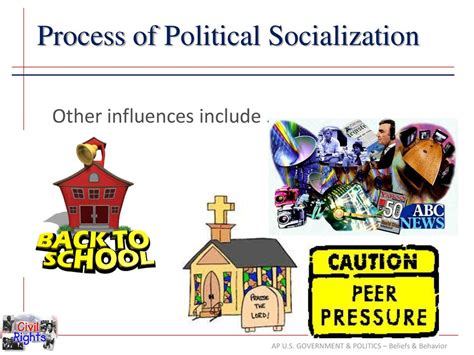Political socialization is the process by which individuals acquire their political beliefs and values. It is a lifelong process that begins in childhood and continues throughout adulthood. Political socialization occurs through a variety of channels, including family, school, peers, the media, and personal experiences.

Agents of Political Socialization
The most important agents of political socialization are:
- Family: The family is the primary agent of political socialization. Parents transmit their own political beliefs and values to their children through both explicit teaching and implicit modeling.
- School: School is another important agent of political socialization. Students learn about politics through their history, civics, and government classes. They also interact with teachers and other students who may have different political views.
- Peers: Peers can also influence an individual’s political beliefs and values. Friends and classmates often share similar political views, and they can reinforce each other’s beliefs.
- Media: The media is a powerful agent of political socialization. Individuals are exposed to a variety of political messages through the news, social media, and entertainment. These messages can shape an individual’s understanding of politics and their own political views.
- Personal experiences: Personal experiences can also influence an individual’s political beliefs and values. For example, an individual who has been discriminated against may be more likely to support policies that promote equality.
Stages of Political Socialization
Political socialization occurs in a series of stages throughout an individual’s life. These stages are:
- Childhood: During childhood, individuals learn about politics from their parents and other adults. They begin to develop their own political beliefs and values.
- Adolescence: During adolescence, individuals begin to form their own independent political views. They may challenge the beliefs of their parents and other adults.
- Young adulthood: During young adulthood, individuals continue to develop their political beliefs and values. They may become more involved in politics and start to participate in the political process.
- Adulthood: During adulthood, individuals’ political beliefs and values become more stable. They may continue to change over time, but they are less likely to change dramatically.
Political Socialization and Political Behavior
Political socialization has a significant impact on political behavior. Individuals who are socialized into a particular political culture are more likely to adopt the beliefs and values of that culture. For example, individuals who are socialized into a democratic culture are more likely to value democracy and to participate in the political process.
Political Socialization and Political Change
Political socialization can also be a source of political change. When individuals are exposed to new ideas and experiences, they may change their political beliefs and values. For example, individuals who move to a new country may adopt the political beliefs and values of their new country.
Conclusion
Political socialization is a complex and lifelong process that has a significant impact on political behavior and political change. It is important to understand the process of political socialization in order to understand the political behavior of individuals and the political dynamics of society.
